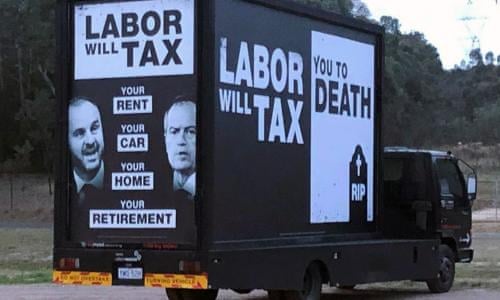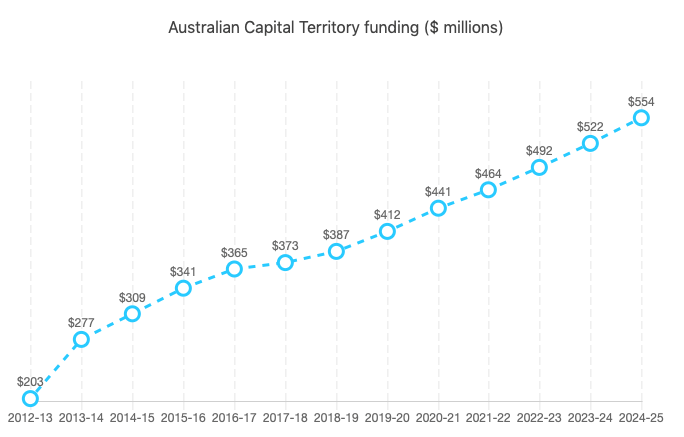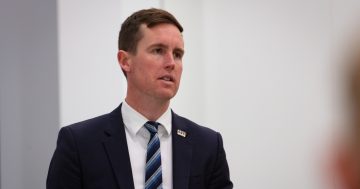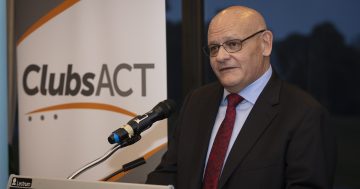
Andrew Barr was a regular feature in the Liberals’ federal campaign in 2019. Photo: File.
RiotACT’s report that the Greens want to introduce truth in political advertising laws should frighten every Canberran – it highlights a growing totalitarian streak running through the Greens.
Caroline Le Couteur enthusiastically jumped on the petition to remove Alan Jones from advertising on Canberra buses. The petition originated with Canberra businesswoman Peta Swarbrick, but you’d be hard-pressed to know that, considering the Greens’ enthusiasm to get rid of Jones.
Swarbrick’s petition called on “Transport Canberra to immediately remove from bus advertising all advertisements promoting people who make sexist public comments, including Alan Jones” and to ensure “that promotion of people who make sexist public comments is added to the bans in the Transport Canberra advertising guidelines”.
That’s a mighty broad brush. And highly subjective. It’s safe to assume that “sexist public comments” are just the beginning. Surely to the list of sins would be added racism and homophobia. If not, why not?
And this is where it starts to get dicey.
If you publicly opposed same-sex marriage, does that make you a homophobe? That depends on who’s making the assessment.
Ms Swarbrick isn’t a fan of Alan Jones. Fair call. That’s a big club, as the RioACT poll attests. But what if there were an advertisement for a speaking tour by Bill Clinton? Should that advertisement be accepted?
It’s difficult to decide whether this is a slippery slope, the thin end of the wedge or the thin end of a slippery wedge. But the Greens do seem to be on a roll.
As RiotACT reported last weekend, the Greens’ latest proposal is to introduce truth in political advertising laws.
How could this be a bad idea? Surely we want truth in politics! It seems so. An Australia Institute poll released in August 2018 shows that 84 per cent of Australians support truth in political advertising laws.
You might wonder why the number was so low, considering no one is arguing for the alternative or, more accurately, more of it.
The problem with the lack of truth in politics is not the politician, though. It’s us. Until we impose a cost greater on parties than the price of the lie we should expect more of the same.
There is another reason to lie: it works.
The Greens say we need truth in political advertising laws because of claims like the Liberals’ 2019 allegation that Labor wanted to introduce a death tax, a campaign in which the Chief Minister and ACT Labor were prominent features.
Under the Greens’ proposed legislation, the death tax claim could have been the subject of a complaint. The Liberals might have copped a $25,000 fine.
The ruling would have been made, we can assume, by an “independent” body. Yes, the dreaded air quotes, because the ACT has had the same party/coalition in government for five terms.
How independent would those appointees be?
Caroline Le Couteur might be happy with a Labor-Green-appointed panel but what if the tables were turned?
What if a ‘conservative’ panel were ruling on the truthfulness of Greens’ advertising? What if they ruled that claims about climate change were overblown? Hyperbolic? Or even lies?
In 2016, Labor’s health advertisement started with this line from Chief Minister Andrew Barr: “Despite Federal cuts, Canberra has one of the best health systems in Australia …”
The Commonwealth Department of Health seems to disagree with Barr’s statement.

Total Australian Government hospital funding to the ACT. Source: Department of Health.
Does that make Barr’s statement a lie?
Let’s assume it was completely factual but a complaint was made. Even if the allegation was overturned, the news story for that day (at least) would be that Labor’s claim was a lie. The independent body could be doing the dirty work of political parties.
No one likes to be lied to, but lies are preferable to the alternative: a curtailment on political speech in which pubic servants become tools of political parties and are forced to adjudicate on hypotheticals.
David Murtagh is a Canberra writer and podcaster.
















